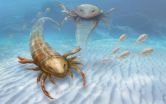(Press-News.org) The fossil of a previously unknown species of 'sea scorpion', measuring over 1.5 meters long, has been discovered in Iowa, USA, and described in the open access journal BMC Evolutionary Biology.
Dating back 460 million years, it is the oldest known species of eurypterid (sea scorpion) - extinct monster-like predators that swam the seas in ancient times and are related to modern arachnids.
The authors named the new species Pentecopterus decorahensis after the 'penteconter' - an ancient Greek warship that the species resembles in outline and parallels in its predatory behavior.
Lead author, James Lamsdell from Yale University, USA, said: "The new species is incredibly bizarre. The shape of the paddle - the leg which it would use to swim - is unique, as is the shape of the head. It's also big - over a meter and a half long!"
He adds: "Perhaps most surprising is the fantastic way it is preserved - the exoskeleton is compressed on the rock but can be peeled off and studied under a microscope. This shows an amazing amount of detail, such as the patterns of small hairs on the legs. At times it seems like you are studying the shed skin of a modern animal - an incredibly exciting opportunity for any paleontologist."
The new eurypterid species is represented by more than 150 fossil fragments, excavated from the upper layer of the Winneshiek Shale in northeastern Iowa - a 27 meter thick sandy shale located within an ancient meteorite impact crater and mostly submerged by the Upper Iowa River.
Some large body segments suggest a total length of up to 1.7 meters, making Pentecopterus the largest known eurypterid from its era.
Pentecopterus is about 460 million years old, making it ten million years older than the previous oldest record of the eurypterid group.
Some features of Pentecopterus revealed in the fossils also allow the researchers to interpret the functions of certain body parts. The rearmost limbs include a paddle with a large surface area, and joints that appear to be locked in place to reduce flex. This suggests that Pentecopterus used these paddles to either swim or dig.
The second and third pairs of limbs may have been angled forward, suggesting that they were involved primarily in prey capture rather than locomotion. The three rearmost pairs of limbs are shorter than the front pairs, suggesting that Pentecopterus may have walked on six legs rather than eight.
The exceptional preservation of the exoskeleton also helped the researchers to interpret the role of finer structures, including scales, follicles and setae (stiff bristles).
The rearmost limbs are covered in dense setae. These form arrangements similar to swimming crabs, where they function to expand the surface area of the paddle during swimming. But the smaller follicle size in eurypterids suggests that the setae could have had a sensory function.
Spines are also present on some limbs and appear similar to those found on horseshoe crabs where they aid in processing food.
INFORMATION:
Media Contact
Joel Winston
Media Officer
BioMed Central
T: +44 (0)20 3192 2081
M: +44 (0)7766540147
E: Joel.Winston@biomedcentral.com
Notes to editor:
1. Images, including an artist's impression and fossil photos, are available here: http://bit.ly/1fGhVXY
The credit information provided in the filenames must be included in any re-use.
2. Research article
The oldest described eurypterid: a giant Middle Ordovician (Darriwilian) megalograptid from the Winneshiek Lagerstätte of Iowa
James C. Lamsdell, Derek E. G. Briggs, Huaibao P. Liu, Brian J. Witzke and Robert M. McKay
BMC Evolutionary Biology 2015
doi 10.1186/s12862-015-0443-9
For an embargoed copy of the research article, please contact Joel.Winston@biomedcentral.com
After embargo, article available at journal website here: http://dx.doi.org/10.1186/s12862-015-0443-9
Please name the journal in any story you write. If you are writing for the web, please link to the article. All articles are available free of charge, according to BioMed Central's open access policy.
3. BMC Evolutionary Biology is an open access, peer-reviewed journal that considers articles on all aspects of molecular and non-molecular evolution of all organisms, as well as phylogenetics and palaeontology.
BMC Evolutionary Biology is part of the BMC series which publishes subject-specific journals focused on the needs of individual research communities across all areas of biology and medicine. We offer an efficient, fair and friendly peer review service, and are committed to publishing all sound science, provided that there is some advance in knowledge presented by the work.
4. BioMed Central is an STM (Science, Technology and Medicine) publisher which has pioneered the open access publishing model. All peer-reviewed research articles published by BioMed Central are made immediately and freely accessible online, and are licensed to allow redistribution and reuse. BioMed Central is part of Springer Science+Business Media, a leading global publisher in the STM sector. http://www.biomedcentral.com
Many of the most memorable stories in the history of science revolve around the conscious realization of an idea - the "Eureka!" moment. But what triggers these moments? Is there always some serendipitous event preceding a sudden epiphany, such as when Isaac Newton famously figured out gravity when he saw a falling apple?
Writing in September's Physics World, Vitor Cardoso talks about how these questions led him on a quest of discovery through the web-based project The Birth of an Idea, which he co-founded with artist Ana Souse Carvalho.
"Ana and I had been talking ...
Women living in poor areas in the UK are almost twice as likely to develop clinical anxiety as women in richer areas. However, whether men lived in poorer or richer areas made no difference to their levels of generalised anxiety disorder (GAD). These are amongst the main findings of a major survey on how socio-economic factors affect mental health in the UK.
Generalised anxiety disorder is one of the most common mental health conditions in modern society, but little objective work has taken place to show the factors in society which can lead to the development of anxiety. ...
How do you convince someone with schizophrenia or other psychotic disorders that they are ill if they don't want to believe it? If you don't recognize that you are ill, you may resist treatment, but is there something which causes this lack of awareness? Awareness of illness, also known as 'insight', is a serious problem in the treatment of psychotic patients. Now work being presented at the ECNP Congress in Amsterdam investigates whether concentrations of a marker of brain cell dysfunction are associated with impaired insight.
Past studies have indicated that an area ...
Men with relatively unaggressive prostate tumors and whose disease is carefully monitored by urologists are unlikely to develop metastatic prostate cancer or die of their cancers, according to results of a study by researchers at the Brady Urological Institute at Johns Hopkins, who analyzed survival statistics up to 15 years.
Specifically, the researchers report, just two of 1,298 men enrolled over the past 20 years in a so-called active surveillance program at Johns Hopkins died of prostate cancer, and three developed metastatic disease.
"Our study should reassure ...
Lincoln, Neb., Aug. 31, 2015 -- Using an enormous X-ray laser -- one of only two such machines on Earth -- University of Nebraska-Lincoln physicist Matthias Fuchs and scientists from around the world beat formidable odds to observe one of the most fundamental interactions between X-rays and matter.
The findings can aid future studies and may lead to novel new ways to diagnose matter in the future.
Fuchs and his colleagues induced two X-ray photons to simultaneously collide with a single atom, which converts them into a single higher-energetic X-ray photon. It's a phenomenon ...
New York, NY--August 31, 2015--With the rise of CO2 in Earth's atmosphere, understanding the climate of tropical forests--the Amazon in particular--has become a critical research area. A recent NASA study showed that these regions are the biggest terrestrial carbon dioxide sinks on our planet, absorbing 1.4 billion metric tons of CO2 out of a total global terrestrial absorption of 2.5 billion. To simulate the tropical climate to learn more about its processes, climate scientists have typically been relying on general circulation models (GCMs) to simulate the tropical climate. ...
Longer, less frequent climate fluctuations may be contributing to abrupt and unexplained ecosystem shifts in the North Pacific, according to a study by the University of Exeter.
Researchers have long been puzzled by two rapid and widespread changes in the abundance and distribution of North Pacific plankton and fish species that impacted the region's economically important salmon fisheries. In 1977, and again in 1989, the number of salmon in some areas plummeted, while it increased in other areas. These events have been dubbed regime shifts by researchers.
Now, in ...
A new study led by a UC San Francisco sleep researcher supports what parents have been saying for centuries: to avoid getting sick, be sure to get enough sleep.
The team, which included researchers at Carnegie Mellon University and University of Pittsburgh Medical Center, found that people who sleep six hours a night or less are four times more likely to catch a cold when exposed to the virus, compared to those who spend more than seven hours a night in slumber land.
This is the first study to use objective sleep measures to connect people's natural sleep habits and ...
Multiple System Atrophy (MSA), a neurodegenerative disorder with similarities to Parkinson's disease, is caused by a newly discovered type of prion, akin to the misfolded proteins involved in incurable progressive brain diseases such Creutzfeldt-Jakob Disease (CJD), according to two new research papers led by scientists at UC San Francisco.
The findings suggest new approaches to developing treatments for MSA, which currently has no cure, but also raise a potential concern for clinicians or scientists who come in contact with MSA tissue.
The new findings mark the first ...
Scientists have long associated sufficient sleep with good health. Now they've confirmed it.
In 2009, Carnegie Mellon University's Sheldon Cohen found for the first time that insufficient sleep is associated with a greater likelihood of catching a cold. To do this, Cohen, who has spent years exploring psychological factors contributing to illness, assessed participants self-reported sleep duration and efficiency levels and then exposed them to a common cold virus.
Now, Cohen, the Robert E. Doherty University Professor of Psychology in the Dietrich College of Humanities ...



